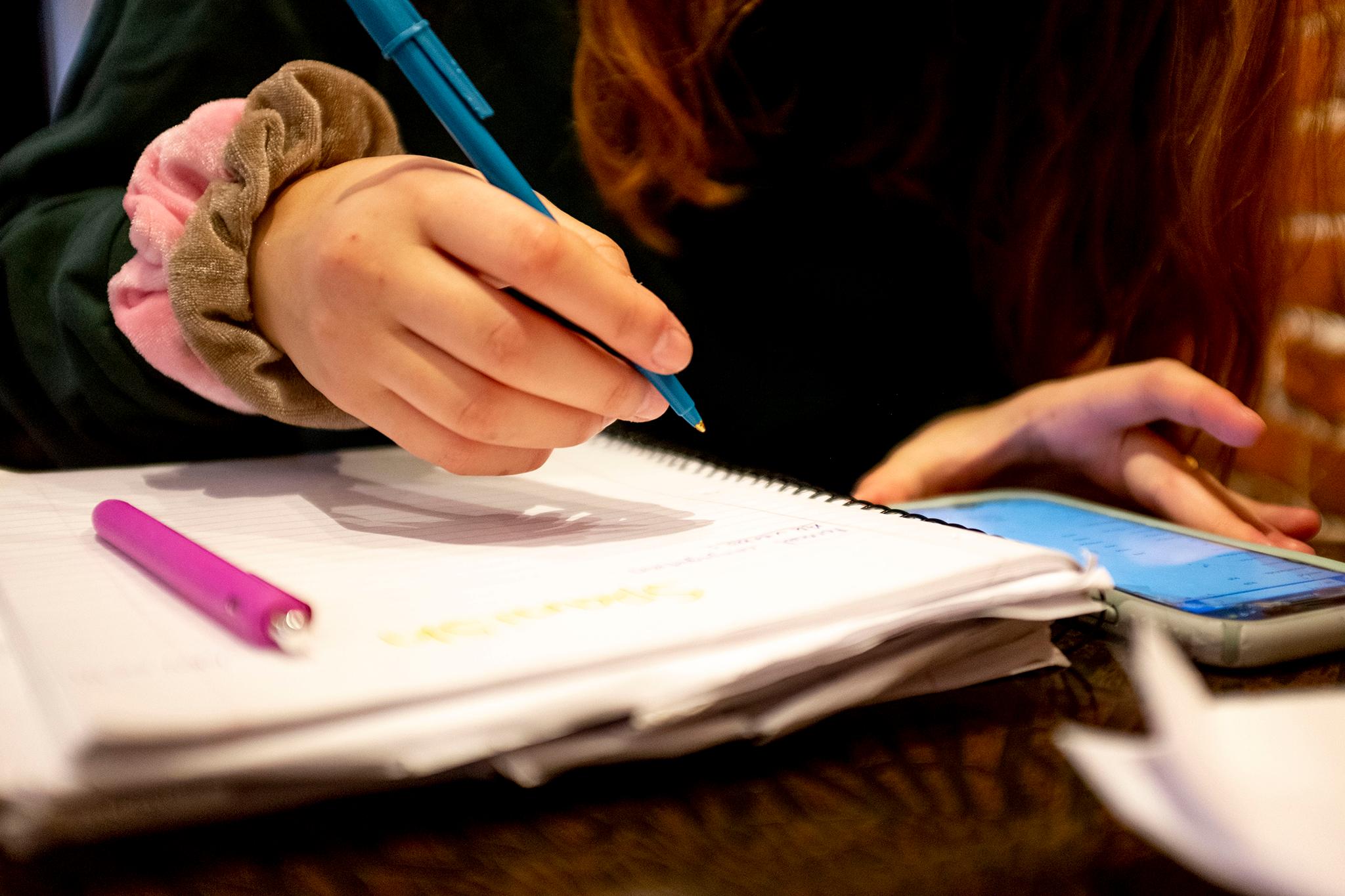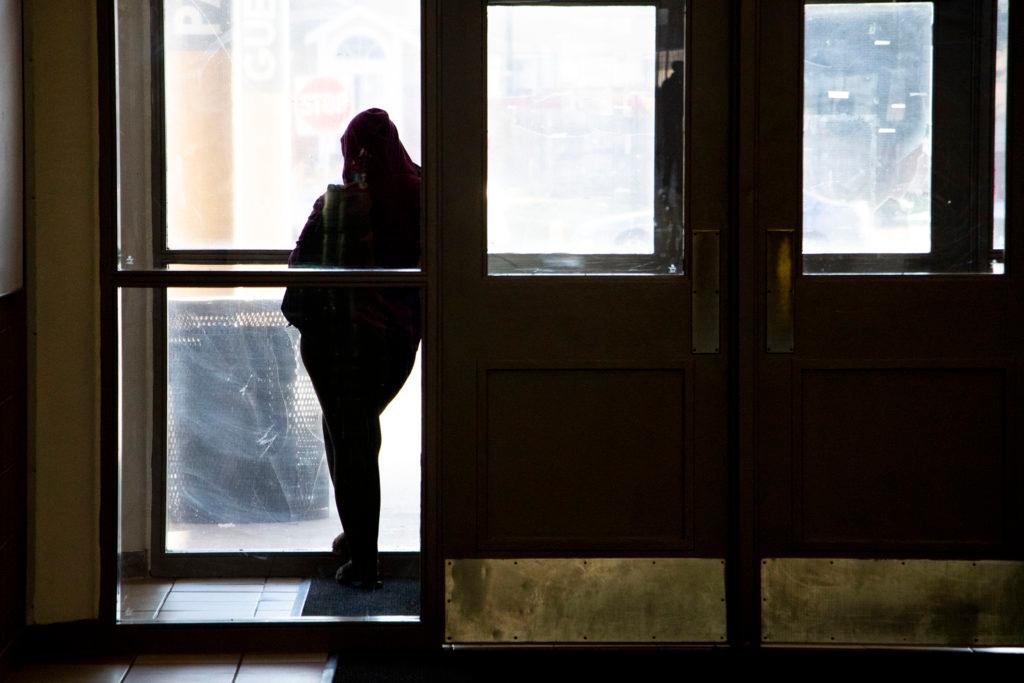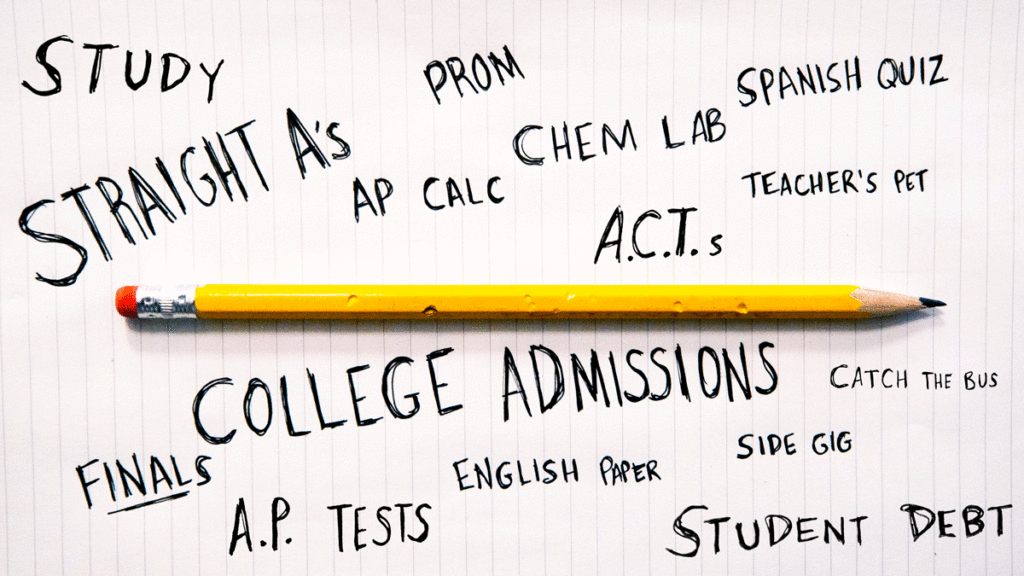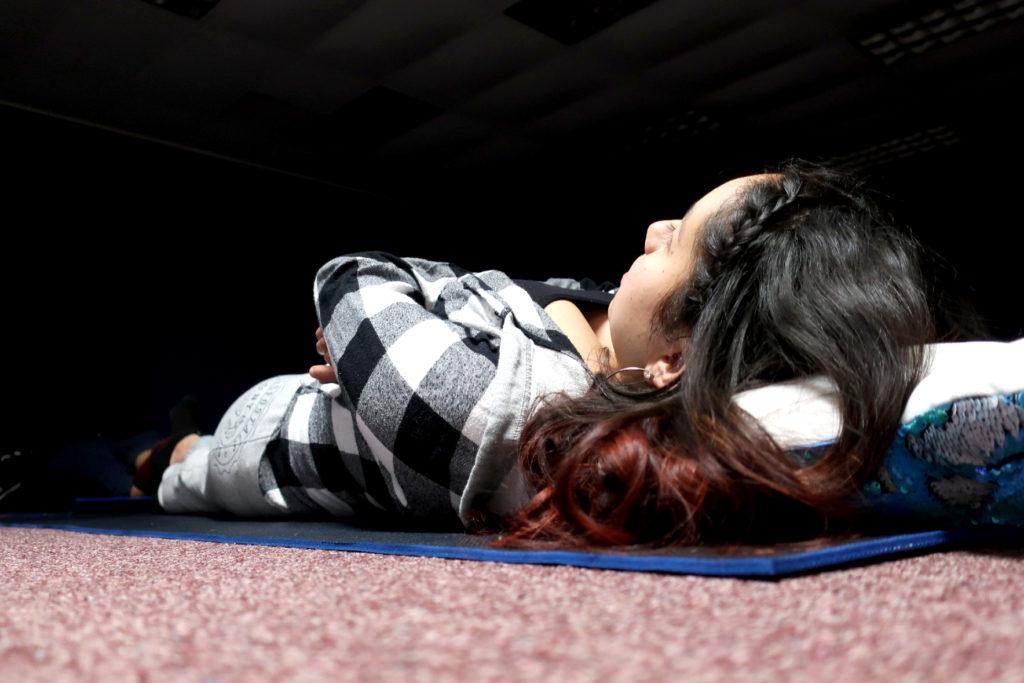
Problem: Teens who feel like they’re under constant academic pressure are at greater risk of developing depression or anxiety. Pushing teens to excel also can hurt self-esteem and increase sleep deprivation.
These are things that teens and parents can do right away to make the stress of school better come from a talk by Lisa Damour, a psychologist, educator and author of Untangled: Guiding Teenage Girls Through the Seven Transitions Into Adulthood” and “Under Pressure: Confronting the Epidemic of Stress and Anxiety in Girls.” She writes a monthly column on adolescence for the New York Times.
Tips for parents and teens
1. Know some stress is good
Parents: Talk to teens about stress. Explain to them that some stress such as working outside your comfort zone is good. School is supposed to push your thinking. But Damour says for many students, school has become a form of chronic stress with no opportunity for recovery. To ease the pressure, students have to take class loads that are manageable and build in recovery time. Don’t let your teen overschedule. Damour uses a metaphor of weightlifting.
“If you are in the gym all day, every day, you're going to get injured. If you are working nonstop without any break, you will burn out.”
Teens: Know how you like to recover from school. It could be watching an episode of “SpongeBob SquarePants” after school. It could be taking a nap or playing a video game or taking a walk. Some stress is normal and good and helps you grow. But chronic stress is bad and you will burn out. Don’t overschedule your life.
2. Protect sleep
Damour says if she had to boil down in one word why we are seeing so much stress and anxiety in teens it would be “tired.”
“They’re just tired,” she said.
One study shows 35 percent of teens report that stress caused them to lie awake at night and for teens who sleep fewer than eight hours per school night, 42 percent say their stress level has increased over the past year.
Parents: Get the technology out of the bedroom, including grown-ups’ bedrooms. If you can, Damour says, there should be no technology in bedrooms 24 hours a day. Elementary students need on average 11 hours of sleep a day. Middle school, 10 hours. High school, nine hours.
Teens: Get the technology out of the bedroom. Sleep is the glue that holds us together. We’re better at thinking, solving problems, coping with difficult emotions, we’re in better moods, Damour says. If we don’t get enough sleep, that is when we feel stressed, that is when we feel anxious, that is when we feel fragile. Using technology in a bedroom during the day actually corrodes your ability to fall asleep at night in that same bedroom even if the tech isn't there at night.

3. Planning for when you are unmotivated
Parents: Talk to teens about the fact that it’s a normal thing to feel unmotivated sometimes. There are strategies to confront that.
Damour says we tend to transmit the message that the ideal kid is the one who is psyched all the time about whatever we put in front of them — and that’s not how humans operate.
Parents can help their teens or children plan for when motivation is not there. Damour says if a kid is unmotivated, offer your company. Do email next to them and pay bills. Not being alone with difficult work goes surprisingly far, she says. Help them with the tips below.
Teens: Tricks to get you organized.
- Ordering work: Figure out how to order your work. Do you like to do what you like least first or last?
- The 25-5 method: Work hard for 25 minutes, then take a 5-minute break (for example, using a phone or playing a quick game).
- The M&M method: Do five problems, then get two M&M’s. Five more problems, two more M&M's, etc.
“This is not stooping,” Damour said. “This is strategy. The kids for whom school feels most manageable are not the kids with the highest IQ. School is most manageable for the kids who have the best strategies for motivating themselves to do the work they don't feel like doing. And we should just talk openly about that that is what academic success often requires.”
Having strategies for getting work done reduces stress.
4. Be careful in what we praise and how we convey disappointment.
Parents: Praising the right things can reduce stress for teens. A lot of parents say, “Oh, just put in your best effort, that’s what’s important.” But when we see the bad grade, our eyes convey something else — even if a kid has put in the effort. Parents who praise the effort and the process and not the outcome reduce stress. If disappointment increases stress, do the opposite to reduce stress.
What are some examples of that?
Praise a teen for pushing through a class where they don’t like the teacher. Or when they decide they don’t want to take four advanced classes like their friends are — which is unhealthy. Praise them when they cultivate hobbies that won't show up on a college application. And finally, Damour says, we tend to praise inefficiency, for example, the student who does more than what’s asked. Praise efficiency instead.
“You know, I saw that you thought you had a pretty good sense of how you were going to do on that test and so you went online and found three sample tests and took them and you crushed them and so you did not study any further. That is some good work,” she said.
Talk openly and often to your teen about the range of pathways after high school and that life is a zig-zag path where sometimes you fall off and sometimes you get back on.
Teens: Look for efficiencies and take a healthy course load. Think about what is a realistic course load. Don’t overload on advanced classes just because your friends are doing that. If you are college-bound, what is a realistic option and what are the requirements? Life is much more than a college application. Develop a hobby that doesn’t go on a college app. Talk to a range of adults about their path in and after high school and you will find overwhelmingly it was not a heavy course load, straight A’s and a spot at Harvard.

5. Look at the data on what leads to adult well-being.
Parents: Economic and professional success do not equate to happiness. Parents tend to assume that it does and then reverse engineer from that point. They say, “OK, they need to go to a ‘good college.’” How do they do that? That depends on their grades and then that comes down to their being curious about what a kid gets on every quiz. That assumption that the goal to a child’s long term well-being is the ‘A’ on the test today is not supported by data, Damour says.
The data shows if you are poor, your well-being is low. But once you are comfortably above the poverty level, there is no additional benefit to well-being with the more income you have. We know exactly what is correlated with adult well-being: high-quality relationships, doing work you find meaningful, you feel like you are good at your job, and good physical health.
“It turns out that the main factor in childhood and adolescence that is correlated with these terrific wellbeing outcomes is conscientiousness, being a kind, decent ethical person, being long on character. If you are a kind, decent and ethical, you tend to have good relationships, you tend to do meaningful work, you tend to be decent at your job and it can contribute to long term health.”
So what does that mean for parents? Damour says model high standards for ethical behavior and hold kids to them. Live the values you say you believe in.
Teens: Read the above. Understand that working to be a kind, decent, and ethical person will lead to more happiness in life than straight A’s.
6. PDF (playtime, downtime, family time)
Parents and teens: A simple way to remember stress-reducing tips comes from the group Challenge Success. PDF = playtime, downtime, and family time. PDF is good for preschoolers through teens.
Play: Parents should be an active voice in helping their teen not overschedule. They should have unstructured time to hang out with friends in person and hobbies just for fun. Also encourage going outside -- taking a walk, shooting hoops.
Downtime: Time to relax, reflect and just ‘be.’ Encourage them to take breaks. Thirty minutes after school to listen to music, read or play a video game. This lets them reset.
Get eight to ten hours a sleep a night.
Turn off media 30 to 60 minutes before bedtime. No screens in the bedroom at night. Screen light affects sleep.
Family time: This creates a sense of connection and belonging. Research shows that when teens are in a family that spends time together, they are more likely to feel safe, supported and loved unconditionally.
Unplug during meals, before bedtime, and family activities.
Involve teens in selecting, organizing, and doing family service projects.

7. Incorporate relaxation techniques into your life
Teens: Learn how to relax. Colorado State University has a handy tip sheet for dealing with test anxiety. There are some additional resources and tips listed on the Stress Management resource page of CSU’s website, teaching you relaxation methods such as Deep Breathing, The Calming Response, Imagery, Progressive Muscular Relaxation, and Guided Meditation Podcasts.
Here are some articles from the University of Colorado Boulder’s Health Wellness Services on de-stressing and other mental health issues. These are the most common signs of distress. Here are some tips for responding to a friend in distress. And here are some more tips for a friend who might be suicidal.
8. Get into nature, go outside or even look at a plant
Teens: Emma Seppälä is the science director at Stanford’s Center for Compassion and Altruism Research and Education and is the author of The Happiness Track. She says we grossly underestimate how much nature helps decrease anxiety and depression while increasing creativity and altruism and connection to other people. If nature isn’t available, research shows going into a park is helpful. If that’s not possible, bringing a plant into your building or home helps.
“The research has found that...even if you don't have windows in your office or school, wherever, even just having pictures of plants and vegetation on the walls or even on a desktop has an impact.”
9. Parents: back off; teens: plan ahead
Parents: Get out of the role of constantly managing and checking in about your child’s homework. That increases teens’ stress. Instead, establish a “look ahead” for the week where parent and teen sit down and discuss what’s ahead for the week.
Let teens deal with the consequences of their actions. Only step in when a negative pattern emerges and then listen to them about what’s going on. Encourage teens to interact with the teacher, not the parent interacting with the teacher.

Tips for schools and teachers
1. Allow time for introspection, reflection and silence.
Seppälä says by keeping students too busy and overstressed and pressured, “they’re actually less able to focus, pay attention and learn.” She says this is fueling a creativity crisis in high school and college students, at the same time creativity is the number one trait sought by employers.
“Creativity can only come about when you have idle time, when you have free time, when your mind is in a meditative space, when you are bored, when you are daydreaming.”
2. Implement evidence-based mindfulness/stress reduction programs.
At the college level, researchers studied four different mindfulness/stress reduction programs. The control group, which didn’t receive any intervention, had significantly higher stress and burnout rates at the end of the semester. Some programs showed some positive results but the results from a program called the Sky Campus Happiness program “popped on everything,” says Seppälä — they showed improved social connection and happiness and decreased anxiety and depression.
“That gives us a lot of hope. And also we know that when students are happier and doing better, they are going to be more successful.”
At the high school level, researchers studied the Sky Schools program, which offers youth practical tools and life skills to manage stress and emotions.
Dara Ghahremani, associate research faculty in the Laboratory of Molecular Neuroimaging at UCLA, tested the program with Los Angeles high school students.
“What we found was that when students engaged in this breathing technique, they were able to activate their prefrontal cortex, the part of the brain that regulates mood and other behavior, like decision making and goal planning. It's the part of the brain that makes us stop for a second before we're about to react to something we didn't like.”

Researchers found reduced impulsivity, increased emotional empathy and also the potential to reduce bullying in students who engaged in the regular breathing technique.
Ghahremani says the reason that it is so critical that teens begin incorporating stress reduction practices into their lives is their brains are in such a crucial time — hardwiring the habits they learn for life such as self-control and self-regulation.
One school in Freeport, New York has embraced the program. It does guided breathing exercises for 8 minutes in homerooms at the beginning of the day. Some schools do it after lunch and at the end of the day. There’s a curriculum that goes more in-depth into the language of emotions and the brain for children and for teens. Teachers, security guards, cafeteria ladies - they’re all trained in breathing techniques. There are summer programs students and parents to teach them breathing techniques.
“One of the breathing techniques that we teach them is the victory breath and the other is the straw breath to help them manage their emotions, to really plant seeds in them to say that ‘hey, you have the tools within you, you don't have to purchase anything to help you manage your emotions at home as well,” says John W. Dodd Middle School principal Johane Ligondé.
3. Survey or talk to students about what structures at school can be changed to reduce stress.
Challenge Success has worked with students and schools to implement changes, often based on students’ suggestions like these:
- Put more breaks into the school day.
- Increase passing periods to 5 to 7 minutes. It gives students time to decompress between classes, even if it means lengthening the school day.
- Start school later. If that is not possible, start late every Wednesday.
- Implement a 25 minute 4th-period tutorial. It gives students time to consult with teachers and do their homework.
- Institute a committee of teens to produce videos for a teacher training day featuring students’ honest opinions about how their workload impacts them.










